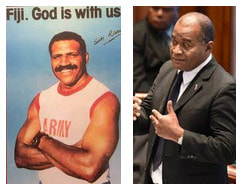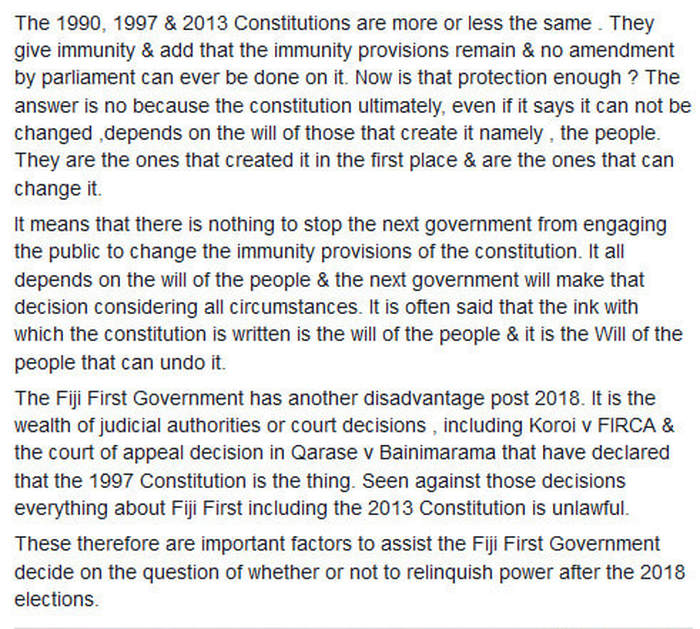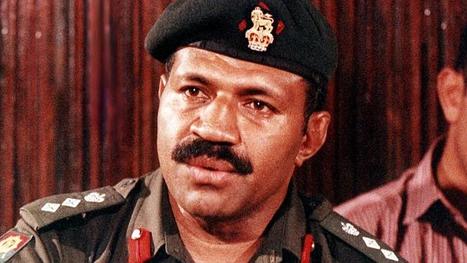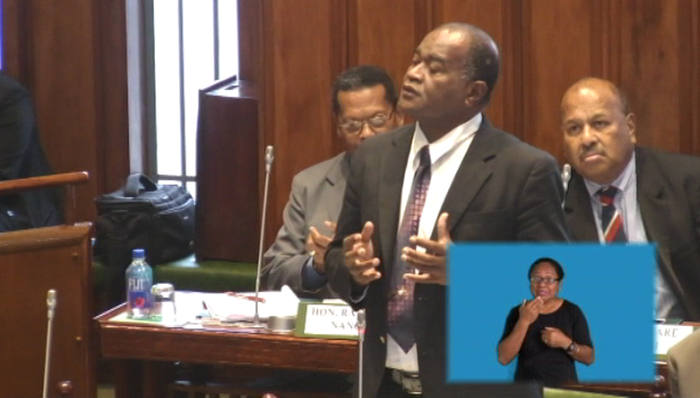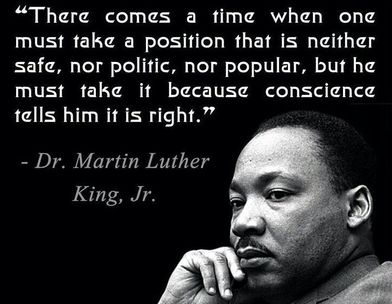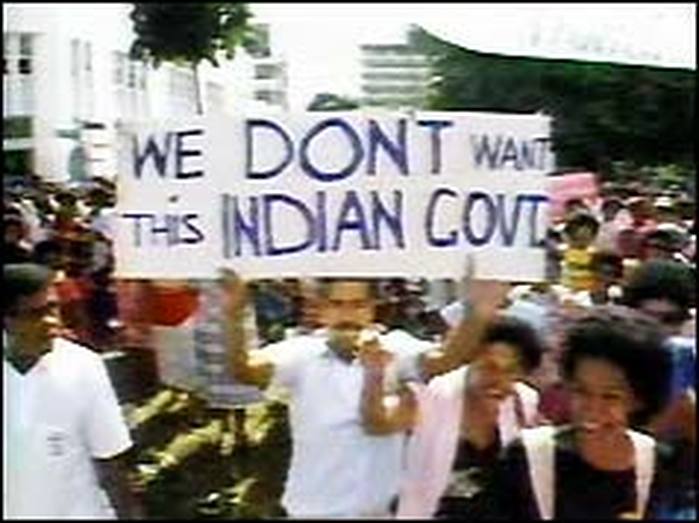Fijileaks: FACE UP! Niko Nawaikula should speak out against SITIVENI RABUKA or shut up if he is willing to to be led by this WITCH of COUPS, hiding under IMMUNITY. Of course, he will not deliver the same legal homily to SODELPA, to persuade them to dump Rabuka, for Nawaikula is emerging as the new Tora-Butadroka incarnate of his party. There is a distinct possibility that some Colonel in the RFMF could step forward, under the Doctrine of Necessity, and lock up SODELPA MPs and Sitiveni Rabuka if they win the 2018 election, citing that all their speeches in Parliament, comments, and postings on social media, indicate that they are planning to take Fiji back to that violent, racist, tribal days of 1987 under Sitiveni Rabuka and the Taukei Movement
Niko Nawaikula, on his Facebook page:
Fijileaks to NAWAIKULA: We suggest you start with your OWN LEADER RABUKA, and read out to SODELPA our Founding Editor-in-Chief VICTOR LAL's Opinion in the Fiji Sun of 2004 on Rabuka's Immunity:
The Queen’s representative, Ratu Sir Penaia Ganilau, pardoned Rabuka before he declared Fiji a Republic but it was unconstitutional act
Her Majesty was saddened the coup-colonel severed 113-year old chiefly link with British Brown
 2004: Victor Lal
2004: Victor Lal The Fiji Sun, 2004
In a robust defence of his treasonable coups of 1987, Sitiveni Rabuka now claims that he did not have to ask for a pardon because he had already ousted Her Majesty, Queen Elizabeth 11, and made Fiji a republic after the coups.
He was responding to questions raised by government senator, Reverend Tomasi Kanailagi, in the Senate on why the people who staged the coup in 2000 have not been pardoned, although the 1987 coup leader was allowed to walk free.
Responding, Rabuka said: ‘Kanailagi has no in-depth knowledge on what he is talking about because I didn't have to be pardoned by anyone ... the only one who could have pardoned me was the Queen, whom I ousted in that coup. I had effectively removed her.
Was Rabuka pardoned?
In order to answer the question we need to examine the events between 19 May 1987 when Rabuka and others were granted prerogative of mercy; 5 October 1987, when he declared Fiji a republic, and 15 October when Ratu Sir Penaia Ganilau resigned as Governor-General. Rabuka had never ousted the Queen; she had ceased to be the head of state on 15 October. Moreover, throughout the 2000 Speight crisis, Rabuka had claimed that he could not be prosecuted because he had obtained immunity from prosecution for his 1987 actions. If that is so, then he was either ‘pardoned’ or granted ‘immunity’.
On 19 May 1987, the Governor-General (G-G), Ratu Penaia, who was also the tribal head of Rabuka’s Cakaudrove province, pardoned Rabuka for his exemplary behaviour after overthrowing the Bavadra government and on the pretext of helping to restore democracy. The G-G went even further, and on the 29 May, promoted Rabuka to full colonel and commander of the military, effective from the date of the coup, 14 May. Ratu Penaia also promoted other officers who had taken part in the coup as well. From the perspective of Fijian provincial and tribal politics, the effect was to strengthen the position of officers from Cakaudrove at the expense of those from Lau and Tailevu.
The Great Republican Debate
On 20 July the Great Council of Chiefs (GCC) met in Suva for a three-day meeting to discuss various alternatives to solve the deepening constitutional, economic, and racial crisis. It was widely anticipated that the extremist Taukei Movement had planned to ask Ratu Penaia to step down and then have the GCC declare Fiji a republic, with an exclusive Fijian government. The Taukei Movement spokesman, speaking at the first day of the meeting, urged the chiefs to revoke the 1874 Deed of Cession and declare Fiji a republic. He was not alone in promoting such a course. Nine of the 14 provinces had passed resolutions calling for an immediate declaration of Fiji as a republic, while the other five had agreed to support a republic only if the G-G’s initiative to bring about a political compromise failed.
The next day the meeting heard Rabuka calling for the formation of a ‘Christian democratic state’ and retention of ties with the Queen, rather than a republic. The GCC, on Wednesday, much to the surprise of many, rejected, for the time being, the idea of declaring a republic, but reserved the right to do so in the future. Rabuka called the decision ‘a consensus between the objectives of the Taukei Movement, the aim of my coup, and the wishes of the Great Council of Chiefs’.
On Friday 31 July, Rabuka was officially installed as commander of the army, ironically, at the Queen Elizabeth Barracks, where he told the 1,500 invited guests: ‘I am really here today as the representative of the great chiefs and the people of Fiji. I am doing this for you.’ More importantly, he was still serving under the Queen’s representative, the G-G, who was also the Commander-in-Chief of the Royal Fiji Military Forces.
Meanwhile, Ratu Mara, Ratu Penaia and Bavadra tried to reach a compromise deal for interim power-sharing in the so-called ‘Deuba Accord’. Rabuka’s response was lukewarm but the Taukei Movement was violently opposed to it. It described the proposed power-sharing as ‘degrading and a sell-out’. Sakiasi Butadroka, the leader of the Fijian Nationalist Party, called for an immediate declaration of a republic. But Rabuka, with the help of the Taukei extremists, struck once again, on Friday 22 September, carrying out a second coup. He announced over Radio Fiji that he had assumed executive authority over the G-G. He detained Bavadra, who was heading west, and also placed the G-G under armed guard at Government House.
However, Ratu Penaia maintained he was still the legal authority and refused to endorse the second coup. He also refused to co-operate when Rabuka and a group of his military officers offered him the tabua (whale’s tooth) for ‘slighting’ their chief. One of Her Majesty’s English magistrates, John Small, was detained and also assaulted. Despite the bullying tactics, the Chief Justice Sir Timoci Tuivaqa and the judges of the Supreme Court refused to recognize Rabuka’s authority. Sir Timoci and the other judges still saw Ratu Penaia as Queen’s representative and repository of authority in Fiji. Rabuka even threatened to dismiss the G-G if it was necessary for ‘legitimising my assumption of executive authority’. Rabuka also disclosed that the ‘Governor-General did not accept’ his offer to become President. ‘It will take lions to move me out of here’, Ratu Penaia said later.
A frustrated Rabuka, therefore, announced that he had assumed full authority, and also indicated that he would declare a republic shortly and offer the presidency to Ratu Mara, which angered the great Lauan chief. The Chief Justice continued to be a thorn in Rabuka’s side. He stated that Rabuka’s proclamation had no legal standing until the G-G was physically removed from office. The worst was to follow. The Queen personally sent a message accusing Rabuka of disloyalty which was broadcast once over the radio in the Fijian language before being suppressed by the military:
She told the nation: ‘For her part Her Majesty continues to regard the Governor-General as her presentative and the sole authority in Fiji. Anyone who seeks to remove the Governor-General from office would in effect be repudiating his allegiance and loyalty to the Queen. Her Majesty hopes that even now the process of restoring Fiji to constitutional normality might be resumed Many Fijians hold firm their allegiance to the Crown and to the Governor-General as the Queen’s personal representative. The Queen would be deeply saddened if these bonds of mutual loyalty and affection which have long so held the Fijian people and the British monarchy together were to be restored.’
Even Siddiq Koya, now a spent political force, and who in 1970 had called for a republic with a Fijian head of state, tried to dissuade Rabuka from declaring a republic.
Briefly, after a long protracted struggle, Rabuka and Ratu Penaia came to a compromise allowing the G-G to act ‘in his own deliberate judgement’. Ratu Penaia had two options: he could resign and clear the way or he could ask the Queen to accept the changes to the constitution approved by him. That night, the G-G contacted the Queen and asked her to consider a constitution with sweeping changes that entrenched native Fijian paramountcy at the expense of the Indo-Fijian population. She refused.
On 9 October, Ratu Mara flew to London to have an audience with the Queen but she politely declined to see him. Instead, she flew to Vancouver to attend the Commonwealth Heads of Government meeting. However, on 15 October, Ratu Penaia suddenly resigned. He wrote to her: ‘My endeavours to preserve constitutional government in Fiji have proved in vain, and I can see no alternative way forward.’ The Queen, in regretfully accepting the resignation, expressed her gratitude for his loyal services and admiration for his courageous efforts to prevent Fiji from becoming a republic, and added that she was sad ‘to think that the ending of Fijian allegiance to the Crown should have been brought about without the people of Fiji being given an opportunity to express their opinion on the proposal.’ On 5 December Ratu Penaia became the new President of Fiji. Rabuka was promoted Brigadier of the Royal Fiji Military Forces.
Pardon and Prerogative of Mercy
It is quite clear from the sequence of events that at no time had Rabuka ousted the Queen, nor had the Governor-General, until 15 October, ceased to be her constitutional representative in Fiji. Rabuka was however pardoned on 19 May 1987, when Ratu Penaia purported to grant immunity to Rabuka in respect of his treasonable actions in overthrowing the lawfully constituted government, by virtue of the prerogative of mercy. The prerogative of mercy is a special power vested in the Head of State, which enables him or her to pardon or reduce the sentence of a convicted person.
Historically, this power has been exercised only in the most exceptional circumstances, such as where a miscarriage of justice has resulted in the conviction of a person who is innocent, or where a prisoner becomes terminally ill, so that it would be overly harsh to require him to serve out his sentence.
But as Professor Yash Ghai and Jill Cottrell (in a chapter to a book Sovereigns and Surrogates-Constitutional Heads of State in the Commonwealth, 1991) have pointed out, it seems that the G-G confused two powers: that to grant a pardon, and that to grant immunity from prosecution, the second of which he did not possess. The 1970 Fiji Constitution contemplated only the former, furthermore, even that power which the G-G possessed under the Constitution, was to be exercised only on the advice of the committee established for the purpose.
In other words, Rabuka’s pardon, or immunity was, and still is, questionable in the eyes of the law.
Moreover, the Queen had never consented to the pardoning.
She had simply ceased to be the Head of State when Ratu Penaia resigned on 15 October, and Fiji’s membership of the Commonwealth had lapsed.
On 14 May 1987, Rabuka therefore committed treason against Queen Elizabeth 11 of England and Fiji but escaped the death penalty.
On 19 May he was resigned to face the gallows, as he boasted: ‘The penalty for treason in all Commonwealth countries is death, and if this is to be my destiny I will accept it.’
But on the same day he managed to extract a questionable pardon, or immunity, from Ratu Penaia who, on 23 May, confirmed that he had granted Rabuka an amnesty.
It therefore follows that Reverend Kanailagi is correct in his assertion in the Senate.
But the pardon was, and remains, illegal because the Queen was still head of state until 15 October 1987, and the G-G had not followed the right procedure as required of him under the Constitution.
She had never authorized Ratu Penaia to perform the unconstitutional act of pardon.
Ratu Penaia himself had refused to accept the illegal takeover at the time of the pardoning
.
He was still, legally, ‘The Queen’s Man’ on the ground in Fiji. And the Queen, the Head of State.
In June 1987 we were even celebrating Her Majesty’s birthday, while Fiji was burning with racial and political strife.
In passing, amnesty was further entrenched in the 1990 racist Constitution and again in the 1997 Constitution, and impunity was not restricted to Rabuka and his close accomplices like Senator Apisai Tora, who played a major role in the destabilization of the Bavadra government.
Even that amnesty and impunity is now in doubt.
For Tora has tabled a motion in the Senate to establish a Commission of Inquiry into the validity of the Constitution.
Is Tora, inadvertently, also prizing open the legal net to bring Rabuka, and many others sitting in the Senate with Tora from the 1987 coups and its aftermath, to justice for treason?
In the old days, there were the hanging, drawing and quartering (including disembowelment while the offender was still alive) of men convicted of high treason in England.
Meanwhile, we repeat to Nawaikula - GO AND GET RID OF RABUKA, first!
WILL THE FIJI FIRST GOVT , OR MORE SPECIFICALLY PM & AG , RELINQUISH POWER AFTER THE 2018 ELECTIONS ?
Suva 12:10:2017
That Is Indeed The Question
In my opinion it all depends on whether or not they feel that their safety is well protected under the law. The question therefore turns ultimately on the immunity provisions and other legal restrictions or avenues available to the government that takes over & to the Public at large.
Lets look at the immunity provisions. The 1990 Constitutional provision on Immunity say the following,
" CHAPTER XIV
IMMUNITY PROVISIONS
Immunity of Members of the Republic of Fiji Military Forces
(including the Naval Division), the Police Force and the Fiji Prison Services and others
164.-(1) The leader of the military coup d'etat which took place in Fiji on fourteenth of May, 1987 and on twenty-fifth of September, 1987 shall be immune from criminal and civil responsibility in respect of the commission of any offence under the penal code or the breach of any law of Fiji and in respect of any damage or injury to property or person resulting either directly or indirectly from the two military coup d'etat and no court hall entertain any action or make any decision or order, or grant any remedy or relief in any proceedings instituted against him in relation thereto
(2) All members of the Republic of Fiji Military Forces (including Naval Division), the Fiji Police Force and the Prisons Services who during the two military coup d'etat referred to in subsection (1) of this section and up to the fifth of December, 1987, had shown allegiance to the coup leader and obediently carried order and instructions of the Fiji Military Government established by the coup leader, shall be immune from criminal and civil responsibility in respect of the commission of any offence under penal code or the breach of any law of Fiji and in respect of any damage or injury to property or person resulting either directly or indirectly from the two military coup d'etat and no court court shall entertain any action or make any decision or order, or grant any remedy or relief in any proceedings instituted against any member aforesaid in relation thereto
(3) Any person who during the two military coup d'etat referred to in subsection (1) of this section and up to the fifth of December, 1987, acted under the direction of a member of the Republic of Fiji Military Forces (including the Naval Division), the Fiji Police Force and the Fiji Prison Services shall be immune from criminal and civil responsibility in respect of the commission of any offense under the Penal Code or the breach of any law of Fiji and in respect of any damage or injury to property or person resulting either directly or indirectly from so acting and no court shall entertain any action or make any decision or order, or grant any remedy or relief in any proceedings instituted against that person in relation thereto.
(4). For the avoidance of doubt-
(a). No court shall entertain any action or make any decision or order, or grant any remedy or relief in any proceedings whether criminal or civil instituted against any Mr ever of the Republic of Fiji Military Forces ( including the Naval Division), the Fiji Police Force and the Fiji Prison Services or against any person acting under the direction of any member of such Forces and Services in respect of damage or injury to property or person arising either directly or indirectly from the two military coup d'etat up to fifth December 1987.
(b). No compensation shall be payable by the State to any person in respect of any damage or injury to his property or person caused by or consequent upon any conduct for which immunity has been granted under this section.
(5). This section shall not be reviewed or amended by Parliament.
Now the 1997 Constitution say the following on
Immunity,
" S195(2) Despite the repeal of the Constitution of the Sovereign Democratic Republic of Fiji (Promulgation) Decree 1990 , Chapter XIV of the Constitution of 1990 continues in force in accordance with its tenor;"
The 2013 Constitution say the following on immunity,
"CHAPTER 10
155. Immunity granted under the Constitution of 1990 continues
Notwithstanding the abrogation of the Constitution Amendment Act 1997 and despite the repeal of the Constitution of 1990, Chapter XIV of the Constitution of 1990 continues in force in accordance with its tenor, and the immunity granted in Chapter XIV of the Constitution of 1990 shall continue.
156. Immunity granted under the Limitation of Liability for Prescribed Political Events Decree 2010 continues
The immunities granted to prescribed persons for prescribed political events under the Limitation of Liability for Prescribed Political Events Decree 2010 shall continue in existence.
Notwithstanding anything contained in this Constitution, the Limitation of Liability for Prescribed Political Events Decree 2010 shall, in its entirety, continue in existence and shall not be reviewed, amended, altered, repealed or revoked by Parliament.
157. Further immunity
Absolute and unconditional immunity is irrevocably granted to any person (whether in their official or personal or individual capacity) holding the office of, or holding the office in, as the case may be-
the President;
the Prime Minister and Cabinet Ministers;
Republic of Fiji Military Forces;
Fiji Police Force;
Fiji Corrections Service;
Judiciary;
public service; and
any public office,
from any criminal prosecution and from any civil or other liability in any court, tribunal or commission, in any proceeding including any legal, military, disciplinary or professional proceedings and from any order or judgment of any court, tribunal or commission, as a result of any direct or indirect participation, appointment or involvement in the Government from 5 December 2006 to the date of the first sitting of the first Parliament elected after the commencement of this Constitution, provided however any such immunity shall not apply to any act or omission that constitutes an offence under sections 133 to 146, 148 to 236, 288 to 351, 356 to 361, 364 to 374, and 377 to 386 of the Crimes Decree 2009 (as prescribed in the Crimes Decree 2009 at the date of the commencement of this Constitution .
158. Immunity entrenched
Notwithstanding anything contained in this Constitution, this Chapter and any immunity granted or continued in this Chapter shall not be reviewed, amended, altered, repealed or revoked.
Notwithstanding anything contained in this Constitution, no court or tribunal shall have the jurisdiction to accept, hear or make any decision or order with respect to any challenge against the provisions of this Chapter and any immunity granted or continued in this Chapter.
3. No compensation shall be payable by the State to any person in respect of damage, injury or loss to his or her property or person caused by or consequent upon any conduct from which immunity has been granted under this Chapter.
No amendment shall be made on Chapter 10 of this Constitution."
The 1990, 1997 & 2013 Constitutions are more or less the same . They give immunity & add that the immunity provisions remain & no amendment by parliament can ever be done on it. Now is that protection enough ? The answer is no because the constitution ultimately, even if it says it can not be changed ,depends on the will of those that create it namely , the people. They are the ones that created it in the first place & are the ones that can change it.
It means that there is nothing to stop the next government from engaging the public to change the immunity provisions of the constitution. It all depends on the will of the people & the next government will make that decision considering all circumstances. It is often said that the ink with which the constitution is written is the will of the people & it is the Will of the people that can undo it.
The Fiji First Government has another disadvantage post 2018. It is the wealth of judicial authorities or court decisions , including Koroi v FIRCA & the court of appeal decision in Qarase v Bainimarama that have declared that the 1997 Constitution is the thing. Seen against those decisions everything about Fiji First including the 2013 Constitution is unlawful.
These therefore are important factors to assist the Fiji First Government decide on the question of whether or not to relinquish power after the 2018 elections.
